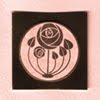Sometimes I just need to disengage. To retreat from the-world-as-it-is into a world of another's dreaming. This weekend was one of those times.
I read
The Secret Country trilogy by
Pamela Dean. She is the author of one of my very favorite coming-of-age books,
Tam Lin, and so I was excited to dive in. The basic premise is that a family of children (brother, sister, and cousins) have a game they play every summer in which they vividly imagine life in their "Secret Country," and act out all the different parts. They create tales of magic and intrigue, assassination and war, in which they are princes and princesses at court. Of course they are then somehow transported into a real live version of their game, but not everything looks as they had imagined it. Some things are just perfect, but there's a character that they didn't write, others won't stay on script, and while they've somehow managed to gain access to some of their character's abilities (magic, sword-fighting, musicianship), they don't have them all. Their attention is divided between trying to play their parts well enough that no one notices, trying to discover how they were able to get there in the first place, and trying to thwart the dramatic and disastrous plot that they themselves created.
On the whole, it was good but not great. (I don't mean to damn it with faint praise; I really did enjoy it.) I think it could have benefited a great deal from a little more aggressive editing. The pace is at times very slow and the story drags, but then all of a sudden things happen in the blink of an eye without a whole lot of explanation. It's a young adult series, really, and I think younger readers might have had trouble following a few of the story's twists and turns. It is my understanding that she has returned to this world and written some adult work, and I am interested in reading it.
The other book I read was
Octavia E. Butler's
The Parable of the Sower. This is a book (and an author) I've been meaning to read for ages so I'm delighted that I loved it every bit as much as I hoped I would. The setting is a near-future Southern California, which has become (along with the rest of the US) a dystopia in which law and order as we know it have essentially ceased to exist. Guns and drugs are everywhere, the police are expensive, ineffectual, and almost as likely to rob you as the roving bands of homeless people, drug addicts, and gangs. Water is more expensive than gasoline. Gasoline is no longer used to fuel vehicles, but instead to start arson fires that drive people out of their settlements so that the scavengers and squatters can move in. What few paying jobs still exist are largely in the hands of huge multinational corporations, and the recently elected President has created laws that essentially allow a return to the days of the "company town" and debt slavery.
Growing up in a small walled enclave, the main character, Lauren, struggles with normal late adolescence issues, with her strict Baptist minister father and her step-mother and step-brothers, with the immanent threat of the destruction of what remains of her community, and with an inherited condition passed to her by her dead, drug-addicted mother: hyperempathy syndrome. Lauren feels the pain (and, rarely, the pleasure) of those around her.
She also struggles with finding her own faith, her own reason for being, and her own God. She discovers/creates a religion she calls Earthseed, based on her own keen observances of life and her study of other religions. The basis of Earthseed, in her words, is:
All that you touch
You Change.
All that you Change
Changes you.
The only lasting truth
Is Change.
God
Is Change.
As Lauren and her discovered companions make their way north, fleeing the tragedies in their wake, these words take on enormous power. I absolutely loved this book. The writing is simply beautiful -- spare, haunting, and brilliant. The main character is a triumph. The religion piece is organic and thoughtful. There is a sequel --
The Parable of the Talents -- that I intend to read at my earliest opportunity. And I will be reading Butler's
other works, as well, I can promise you that.








